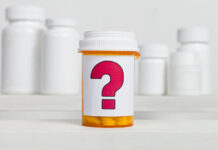New research has shown that only about 15% of people improve more on antidepressants than they would on a placebo. The other 85% are unnecessarily exposed to the harms of the drugs—including sexual dysfunction, weight gain, and emotional numbing. But how to identify that small group of people for whom the drugs seem to be effective?
One recent attempt is pharmacogenomic testing. According to the theory, DNA tests can reveal whether a person has genetic factors that interact with the drug’s effectiveness. With this information, doctors could avoid drugs that have their effectiveness “blocked” by a person’s genes.
Sounds good in theory. But researchers have had mixed results when testing it so far. For instance, the large randomized controlled trial of pharmacogenomic testing (GUIDED), failed on its primary outcome of symptom improvement—although the secondary outcomes showed a slight advantage for those who received testing.
 Now, researchers have attempted another large randomized controlled trial of pharmacogenomic testing (called PRIME Care). A total of 1944 patients took part, recruited from 22 Department of Veterans Affairs (VA) medical centers.
Now, researchers have attempted another large randomized controlled trial of pharmacogenomic testing (called PRIME Care). A total of 1944 patients took part, recruited from 22 Department of Veterans Affairs (VA) medical centers.
In the group that received pharmacogenomic testing, only 18% of the prescriptions had drug-gene interactions, while in the group that did not receive testing, 45% of the prescriptions had drug-gene interactions. In this way, the study could be seen as a success—access to testing meant that far fewer people received drugs that were predicted to interact poorly with their genes.
And this also seemed to improve some outcomes slightly. By the halfway point of the study (12 weeks), 16.5% of those who received testing had recovered from depression (“remission”), while 11.2% of those who did not receive testing had recovered. A promising start.
However, by the endpoint of the study, this small difference had disappeared. The difference between groups was not significant at 24 weeks (six months).
“Overall, there were small positive effects on symptom remission over the 24 weeks with peak differences early in the trial and no significant difference in remission at 24 weeks. The secondary outcomes of response and symptom reduction followed similar patterns,” the researchers write.
That is, receiving pharmacogenomic testing did reduce the amount of predicted drug-gene interactions—but it did not improve actual outcomes by the end of the study. Both groups were just as (un)likely to recover from depression: 17.2% versus 16.0%.
Another way to look at this is as a study of antidepressant effectiveness. At the six-month mark, taking antidepressants led to recovery for 17.2% of people at most.
What about the secondary outcomes? Well, at 24 weeks, 32.1% in the testing group experienced “response” (at least a 50% reduction in PHQ score). That number was 27.5% in the non-testing group, a statistically significant difference. However, over the course of the study, that number was not consistent. At the assessment just previous to that one (18 weeks), the groups were no different in terms of “response.”
The researchers also note that secondary outcomes should be considered “exploratory” since they did not control for multiple testing (which makes positive findings more likely by chance). And they add that they switched the type of statistical test used to compute their outcomes, rather than sticking to the analysis they wrote in the study protocol (which could introduce further bias).
One more methodological point: The researchers write that even the small positive effect early in the trial—which disappeared by the endpoint—may have been a result of the placebo effect. Patients, or their doctors, may have expected those who received genetic testing to improve more.
The researchers write, “There was no attempt to blind either the clinician or patient in the study. Thus, the modest effects in the pharmacogenomic-guided group could be a placebo-type effect.”
Finally, they suggest that there may be a small group of people who benefit from pharmacogenomic testing—those who have specific genetic traits that are known to interact with antidepressant drug metabolism. However, their study was not able to find such an effect, suggesting that the amount of people who would benefit is very small or that the effect is marginal at best.
****
Oslin, D. W., Lynch, K. G., Shih, M. C., Ingram, E. P., Wray, L. O., . . . Thase, M. E., and the PRIME Care Research Group. (2022). Effect of pharmacogenomic testing for drug-gene interactions on medication selection and remission of symptoms in major depressive disorder: The PRIME care randomized clinical trial. JAMA, 328(2), 151-161. doi:10.1001/jama.2022.9805 (Abstract)















At the height of antidepressant popularity I knew no one who had not advised friends and family to get themselves treated by antidepressants. I know all of my friends routinely told friends to get a course of antidepressants quick as possible. I want to know if anyone on MIA also advised their friends to go and get dosed up. It became as if no random conversation did not have the pills chat nested within it. It got like offering a round of drinks or cigarettes. People were told that they were rude not to spare some leftovers of antidepressants to pals. Why was it so easy for billions of people to offer these drugs to friends and family with zero push from anyone in any profession? There is much touting of blame ascribed to one profession but doing so fails to understand why grown up people in every community routinely became drug pushers. These people were not idiots but clever people of strident independant thinking. Nobody is asking the question “why” ordinary folk in every society become millions of medical mules with no cash incentive. It is an important question. We need to look at our own complicity and accountability to understand our motives. People were despairing of bearing the burden of other peoples bad depression, as soon as depression became something more socially acceptable to express. During the nineteen nineties nobody wanted a moping melancholic best friend. Nobody is looking at how burdensome it became to have to be a pal well versed in psychotherapeutic nuggets of wisdom. It got that you could not have a relationship with anyone without having to mop up their messy baggage from the disaster of a previous relationship. Having to be therapist to a romantic date became tiresome and bewildering for many, and so the thought of passing around a pill bottle became like an act of caring, in an exhausting relationship full of wounds. In the nineteen nineties, with the nulification of marriages, soon “the relationship” was God. If you did not have one, an intense psychodynamic plate hurling relationship, then you were consigned to a social vacuum. You would feel depressed out there and come hurtling back into society determined to get “a relationship” and use it to mend your depression, but often the other partner would have had better ideas, like scribbling down the name of an even better version of prozac. The pusher was more often a partner or pal than a family doctor. We miss important knowledge when we do not broaden our inquiry.
Report comment
It is too easy to say every clever person got brainwashed by a prozac advert. I see adverts for cars everywhere that promise bliss yet I do not want a car and have never learned to drive.
When people are brainwashed it is not merely “towards” something attractive, covetable, desired. People are brainwashed “away” from something unattractive, undesireable. What is so unattractive about modern expressions of depression? Perhaps a more ancient form of the expression of depression was more vitalizing, wild, weepy and wonderful. Think poets like Keats and Shelley.
Depression is hard for friends to endure day after day, month after month. To deny that reality is leaving aside an important zeitgheist bit of the jigsaw puzzle, as to why the acceptability of antidepressants spread so fast.
Report comment
A friend disclosed her intense anxiety in context of a high stress job and recovery from covid illness. She was over-sensitive to stimulation and would quickly become overwhelmed by conversation and things that didn’t use to bother her. People in her church were telling her to see a therapist and TO TRY AN ANTI-DEPEPRESSANT. However, I recommended that she find a doctor of holistic or functional medicine. The naturopath doctor she found ordered lab tests and discovered that my friend had Epstein Barr Virus counts that were “off the charts”. She was told that these high counts of Epstein Barr Virus can cause the anxiety. Lots of good nutrition, lysine, and other supplements and rest were prescribed. She took leave from her job. She has also been receiving counseling. She’s doing better.
Report comment
Very insightful . Re: “clever people of strident independent thinking”, we all know some. And the making of relationships into God is so true.
Report comment
Thank you for your reply.
Report comment
The gene-drug interaction tests can tell if there is an incompatibility with a medication, (it doesn’t work for work for lithium) but the test does not tell the doctor or provider if they have the correct diagnosis to begin with. A favorable interaction for an antideprrssant does not matter unless the person has a pure unipolar depression. If a person has mixed states or features, which comprises 60% of all “depressive” presentations, they should not receive antidepressants even if the test is favorable.
https://medicalmodelredux.com/
Report comment
Thanks for your comment, and for posting the link to your website, and the important medico-historical knowledge you bring to the subject. I so appreciate the dedication and time you have put into sharing your life’s work.
Report comment
It is difficult to see what the value of genetic testing is. My understanding is that the testing will tell one whether the drug is well metabolized or not. However, there is a lack of data concerning newer antidepressant blood levels and treatment outcome. Absent clear data on blood levels, the so called drug-gene interactions seem to have little or no clinical meaning.
Report comment
I am confused by this outcome. For context, my genotype (poor metaboliser) is my username. With two null alleles at CYP2D6, I can be predicted to, inter alia, stay awake all night on street drugs and be at risk for side effects from psych drugs, because my main CYP metabolism pathway is not functioning, leaving the low-capacity CYP3A4 to clean up, albeit at a slow and less effective rate (leading to build up of blood levels and more side effects). I don’t understand how me avoiding psych drugs because of knowing this cannot be helpful. The only way I can know to avoid psych (and all) drugs is through gene testing… Have I missed something?
Report comment